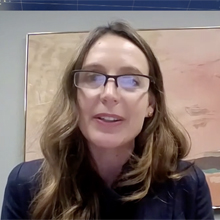Many of us learned to think about negotiation as an adversarial game of give-and-take.
Alexandra Carter, a professional negotiation trainer, wants to teach you a more positive way to ask for what you need – whether your goal is to win a Client, resolve a relationship issue, or achieve a personal milestone.
Since 2012, Carter has led negotiation workshops for women diplomats in partnership with the United Nations. Today, she is a negotiation trainer for the U.N.'s diplomatic corps in New York, Fortune 500 companies, government agencies, and even tween girls in a program to promote self-esteem.
Asking for more isn't about manipulation or tactics, she says, but communicating our own value in everyday conversations with Clients, peers, spouses, kids – and, most importantly, ourselves.
In her bestselling book, Ask for More: 10 Questions to Negotiate Anything, the Columbia Law School professor shares insights on an essential, everyday life skill she believes anyone can succeed at.
Grab your paddle to start a successful voyage
Carter rejects clichés of the tough negotiator making aggressive demands, or one-off talks that produce a winner and a loser.
She prefers the metaphor of negotiating a kayak through a series of sea caves: You must learn your surroundings, adapt to the conditions, and constantly paddle to get to where you want to go.
"You're steering. I teach that negotiation is any conversation in which you are steering a relationship. You are continuously piloting and taking in information to help you toward your goal," she says.
The top reason holding you back from asking for more
A reluctance to look selfish holds many people back from asking for more, suggests Carter.
"Sometimes – especially as women – we think it’s not 'nice' to negotiate. We think, or we’ve been taught, that we should be grateful just to be in the room. 'You get what you get, and you don’t get upset’,” she says.
Carter confronted this early in her career, inspired by a female mentor who offered advice negotiating her first salary.
An offer came in, and it was way better than expected, Carter recalls. "I asked her, 'Should I just take it?' She told me: 'I’ll tell you what you’re going to do, Alex. You’re going to go in and ask for more.' I was incredulous: 'Really? Even if it’s good?'
"And she said, 'Yes. Always negotiate. Because when you teach someone how to value you, you teach him how to value all of us.'
"In that moment, I realized that asking for more is not a selfish act. Quite the opposite: it helps create seats at the table for other women," says Carter.
5 negotiation tools for immediate results
Since that early revelation, Carter has focused her career as a negotiation trainer to help women learn how to ask for more in every area of their professional and personal lives.
In a workshop at Sun Life Global Investments 2021 Women's Investment Symposium, Carter presented a few of the powerful negotiation tools that can bring immediate results.
1. Ask the right questions
Starting any negotiation by asking questions about the other person's needs, concerns and goals gives you the best chance of creating trust across the table to pitch your proposal with success, says Carter.
“Most of negotiation is listening, hearing the words people say, and hearing how they say it,” says Carter.
Avoid closed-ended questions that only require a "yes" or "no." Use open questions, that start with "what" or "how," to invite broad answers and prompt the speaker to share more insights.
2. Try two magic words that can help you negotiate anything: "Tell me..."
Tell me what's on your mind.
Tell me your hopes for this meeting.
"When you start negotiations with the words 'tell me...,' you build trust, reduce defensiveness, and get the most information possible by allowing yourself to hear someone else’s perspective on your problem or goal," says Carter.
In difficult negotiations, this can help move past a black-and-white (or biased) view of a situation and grow in your understanding of an issue.
3. Use silence as a highly effective negotiation tool
Learning how to be comfortable with silence is a key negotiation skill, says Carter. One exercise in her negotiation workshops is to pair people off and instruct one person to speak for three minutes while the other listens. It turns out, most people can't stay quiet for that long!
It's tempting to pipe in and fill silences to demonstrate competence, control a conversation, or show your confidence by having answers at the ready.
Instead, Carter suggests it takes skill to stay quiet and really hear what someone has to say.
"I call this 'landing the plane.' It means you ask your question and then. . . stop talking."
4. Learn to say "I" and "we" when you ask for something
Carter's fresh take on negotiation is rooted in her expertise as a mediator, learning the concerns of all sides to help resolve issues.
It has taught her that framing what you ask for in a way that also meets the other person's needs increases your likelihood of success.
"So for example, you could frame the request as follows: 'Here's what I am requesting, and here's how we both benefit from it'," says Carter.
5. Don't hear "no" as the end of the conversation
Many of us fear the “no.” That if someone turns down our proposal, it's a slight on us or our business.
"One of my favourite topics these days is how to use questions to turn a no into a yes," says Carter. "I find myself turning to one question over and over that helps me create trust in challenging situations. Here it is: 'What are your concerns?'.
Knowing why you didn't get the deal can shed light on what's needed for success.
"Too often we negotiate by leading with what we have to offer, rather than hearing and satisfying our counterpart’s concerns," she says.
This article, published by SLGI Asset Management Inc., contains information in summary form. This article is provided for information purposes only and is not intended to provide specific individual financial, investment, tax or legal advice. Information contained in this article has been compiled from sources believed to be reliable, but no representation or warranty, express or implied, is made with respect to its timeliness or accuracy.






